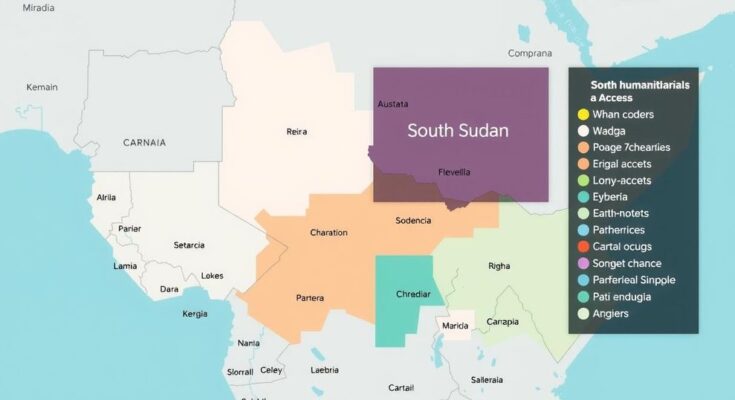South Sudan faced 25 access challenges in February 2025, including violence, bureaucratic hurdles, and rising security concerns, which hindered humanitarian efforts. Clashes between armed groups disrupted services and led to personnel relocations. Notable incidents of violence against aid workers occurred in multiple states, compounding the issue of access to affected areas, particularly with the rainy season approaching.
In February 2025, humanitarian efforts in South Sudan encountered 25 significant access challenges, notably including hostilities from armed groups, bureaucratic hurdles, and targeted violence against humanitarian workers. These obstacles further complicate the provision of vital services. As the rainy season approaches, it is imperative to pre-position essential supplies to maintain critical services, especially when road conditions deteriorate.
In Upper Nile State’s Nasir County, clashes between a militia and the South Sudan People’s Defense Forces (SSPDF) have resulted in instances of displacement, fatalities, destruction of property, and interruptions in humanitarian services. As a precaution, 23 humanitarian staff were relocated from various locations including Mandeng and Ulang in February to enhance their safety and effectiveness.
Violence against humanitarian personnel is a pressing concern in Jonglei, Central Equatoria, and Western Equatoria states. Aid workers faced ambushes, attacks, and looting, with incidents including the murder of two security guards at an OXFAM warehouse by armed youth in Jonglei. Noteworthy incidents on February 26 and 27 involved gunfire directed at a humanitarian convoy and a UN contractor, exacerbating the dangers associated with road travel in the region.
Bureaucratic challenges are notably severe in Renk County, where an international non-governmental organization (INGO) was compelled to pay a US$1,500 registration fee demanded by county labor officials, indicating persistent irregular financial burdens on aid efforts. Additionally, on February 14, security forces in Aweil East County imposed restrictions on vehicular movement, obstructing an INGO team from reaching their target area, showcasing how administrative and security challenges continue to impede humanitarian operations.
In summary, South Sudan’s humanitarian landscape in February 2025 remains fraught with serious access issues due to violence, bureaucratic burdens, and administrative restrictions. The aforementioned challenges significantly hinder the delivery of essential services, particularly with the impending rainy season, necessitating urgent action to ensure that aid can reach those in critical need. Immediate measures must be taken to enhance the safety of humanitarian personnel and to streamline bureaucratic processes to facilitate effective delivery of aid.
Original Source: www.unocha.org




